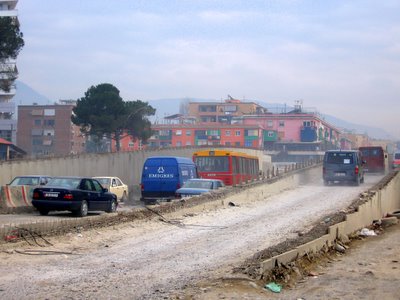Our first encounter with Albanian roads took place on the drive from the airport to the city when we arrived. The roads were bad but not as bad as I had expected, until we reached Tirana. At one junction our car lurched and bounced across what appeared to be a construction site masquerading as a road. As it turned out it was a construction site, for we had just passed Zogu i Zi.
Zogu i Zi is in the west of the city on the road from the port of Durres, which also carries traffic from the airport. The idea was that by reconstructing this junction with an overpass, the flow of traffic into and out of the city would be improved. Construction began, and as you can see from the photograph, a lot of work has already been done.

Then, a new government was elected, promising to investigate the awarding of major contracts by the previous government. An investigation was launched into the building of the overpass at Zogu i Zi and - no surprise to anyone - the new government decided that the contracts were of dubious legality. Not only that, but the government appointed experts assessing the project concluded that the overpass was entirely unnecessary and would pose a threat to pedestrians.
The contractor was ordered to stop work and the government then ordered the demolition of all construction carried out as part of the project. Cue outrage and popular protest. The mayor, Edi Rama, held a protest at the overpass last week handing out documents challenging the government's claims. The Tirana municipality has been fighting the decision through the courts, so far without success.
The Socialist opposition, together with the smaller Socialist Movement for Integration, have promised to resist the decision and protect the overpass. As well as the political dimension of the dispute, the personal animosity between Prime Minister and Democratic Party leader Sali Berisha and Tirana Mayor and Socialist Party chairman Edi Rama, has also become a factor.
Meanwhile, a major junction on one of the most important roads in the country lies in chaos and there is no indication of when something - anything - might be finished.

In the murky world of Albanian politics it is often hard to discern the rights and wrongs of these kinds of situations, but my sympathies are with the Socialist Party and the mayor. It is entirely possible that the process for awarding the contract for the construction was not exactly pure as the driven snow, but I doubt that any major conract awarded anywhere in Albania could stand up to detailed legal and financial scrutiny.
Unnecessary? No. Though given how much work Tirana's roads require, spending that much money on one project might be considered a little extravagant. At worst, though, that is argument for reducing the scale of the project, not for cancelling it entirely.
The idea that a well designed and properly constructed road system increases the risk to pedestrians in Tirana is the funniest aspect of the whole business. Even a badly designed junction would hardly make things any more dangerous for pedestrians than they already are.

Mjaft, the civil society NGO, has come up with an alternative approach, advocating the holding of a referendum in Tirana to decide the fate of the overpass. Referendums are best when used sparingly, but given that the technical issues regarding construction of the overpass are now mixed up with party politics and personal animosities it's hard to know how this issue can be resolved. Meanwhile, as Erion Veliaj of Mjaft notes, Albania's political leaders - who profess to be keen to enhance the coutry's image and attract foreign investment - look increasingly ridiculous.
We will leave Albania in 21 months and I fully expect the drive out to the airport to be as bumpy as the drive in.
Comments
Is that when MI6 renews your contract?
;)